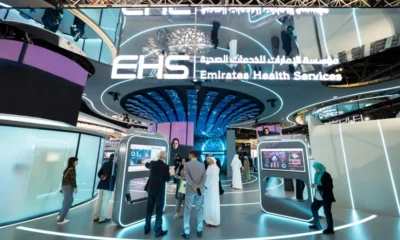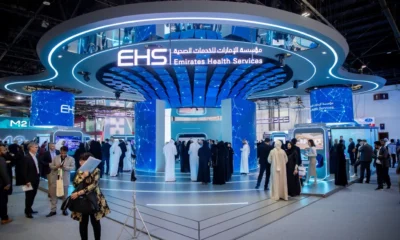MED-EL Medical Electronics, the leading provider of hearing implant systems, has announced the results of its recent survey titled “Responsiveness to Hearing Impairment in the UAE”. The findings indicated an overall weak sentiment concerning the prevalence of hearing impairment, its severity, and rampancy as well as the significance of early diagnosis. This is despite the fact that health professionals acknowledge approximately 1 in 25 babies born in the UAE suffer from some degree of hearing impairment.[1]
In a departure from its previous survey with healthcare professionals, MED-EL conducted this survey to measure the UAE community’s awareness of hearing impairment in the country. Findings are categorized by the incidence of hearing impairment in families, general perceptions, and awareness regarding hearing screening for new-borns.
Taking into account hearing impairment amongst family members, the study revealed that 4% of respondents identified, at least, one case of incidence in their families. When applied to the projected UAE population, this number is equivalent to 410,525 individuals. Astoundingly, of those reported to have hearing impairment, a projected total of 142,863 individuals (34%) have not yet been fitted with hearing implants, hearing aids or undergone other hearing treatments. This is especially true for the younger generation of respondents’ sons and daughters.
Furthermore, the study showed that 81% of the respondents acknowledged to having little to no awareness regarding the prevalence of hearing impairment. More surprisingly, less than a quarter of respondents – only 23% – completely agree to categorizing hearing impairment as one of the top 5 severe health issues in the UAE.
As a key highlight, the dismal results of new-born hearing screening in the UAE indicated that 62% of respondents – which amounts to more than two third of the total respondent pool – stated that their babies were not screened for hearing impairment. The survey also revealed that 20% were unaware that hearing screening could be performed for new-borns. This in part could be attributed to a communication gap between parents to be and their healthcare providers, given that 82% said they had not discussed hearing screening with their healthcare provider before their delivery date.
MED-EL announced the results of its survey at a roundtable conference chaired by Dr. Hussain Abdul Rahman Al Rand – Msc (Cairo), German Board (Facharzt), FRCS Assistant Under Secretary, Health Centers And Clinics, Ministry of Health, UAE. The event was also attended by Professor Dr. Jamal Kassouma, ENT Consultant and Cochlear Implant Program Director, Dubai Hospital, and David F. Raetz, CEO and Regional Director, MED-EL Medical Electronics Middle East.
Addressing the conference, Dr. Hussain Abdul Rahman Al Rand, FRCS Assistant Under Secretary, Health Centers and Clinics, UAE Ministry of Health said: “At the Ministry of Health, it is our mission to ensure the wellbeing of all citizens, and we fully support the UAE’s 2021 vision of becoming among the best countries in the world for quality of healthcare. To that point, these survey results clearly show that hearing impairment is at risk of hindering the health and restricting the potential of many members of our community, should we not take the necessary precautions to educate them on the effects of undetected hearing loss, and set in place simple processes for earlier diagnosis and treatment. This drive truly starts with us at the healthcare professionals’ level. It is commendable that MED-EL has taken the lead in bringing this issue to light, and with stronger partnerships between public and private sectors, we can make a difference.”
Also speaking at the event, David F. Raetz, CEO and Regional Director, MED-EL Medical Electronics Middle East explained: “At MED-EL, we are committed to supporting and working with families, communities and medical organizations to elevate the importance of early diagnosis and required screenings at birth. We are extremely proud to have developed strong relationships with our partners in the UAE and extended region to bring awareness to an issue that is often overlooked.”
He added: “This year we shifted our focus towards members of the community to make the survey more inclusive and accurate. The study, therefore, reflects on the wider population, and gives an indicative glimpse of behavioural directives of those affected by the incidence of hearing impairment in their families as well as those who are not.”
As part of the roundtable, MED-EL, and its partners discussed potential solutions and next steps to be set in place in the UAE to address the low level of awareness and support available for those suffering from hearing impairment. These next steps included support from medical professionals to encourage parents to seek treatment for children as early as possible. Additionally, establishing strong public and private sector partnerships to raise awareness for and educate families on the concerns and available treatment solutions.
“These few steps will make a significant difference in addressing the challenge of increased cases of hearing loss we are seeing affecting the UAE and the region,” commented Professor Dr. Jamal Kassouma, ENT Consultant and Cochlear Implant Program Director, Dubai Hospital. “We cannot stress more the importance of early diagnosis in successfully treating children affected by hearing impairment. By addressing this earlier on, there is a higher chance of improved speech and language development, as well as the opportunity to avoid more complex hearing issues developing as children grow older.”
The survey was conducted by the Pan Arab Research Center on a sample of 523 married men and women across the United Arab Emirates. The survey was conducted from November to December 2015. For more information, please visit www.medel.com.













